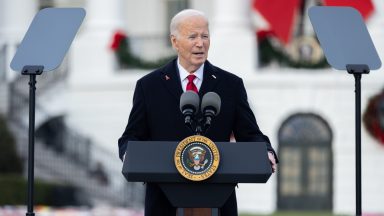ARTICLE AD

President Joe Biden has commuted the sentences of more than 2,000 individuals and pardoning others convicted of nonviolent crimes. According to a White House announcement, those whose sentences are being commuted “were placed on home confinement during the COVID-19 pandemic and have successfully reintegrated into their families and communities.” This marks the largest single-day act of clemency in modern history.
On December 1, 2024, Biden granted his most controversial pardon to his son, Hunter Biden, who was facing sentencing in two criminal cases. The decision represents an unprecedented reversal, as President Biden had previously—and repeatedly—promised not to use his executive authority to pardon or commute his son’s sentence.
“Today, I signed a pardon for my son Hunter,” the 82-year-old stated on December 1. “I believe in the justice system, but as I have wrestled with this, I also believe raw politics has infected this process and it led to a miscarriage of justice,” Biden added. “I hope Americans will understand why a father and a President would come to this decision.”
Hours before his presidency concluded in January 2025, Biden issued preemptive pardons to several more individuals, including Dr. Anthony Fauci and members of the January 6 Committee.
Find out who else Biden has granted clemency to as his presidency nears its end.
BREAKING: President Biden preemptively pardons Fauci, Milley and Jan. 6 committee before President-elect Trump takes office. https://t.co/1Wy5SiSsyb
— CBS News (@CBSNews) January 20, 2025
What Is Clemency and How Does It Differ from a Pardon?
Clemency is an official act of mercy or leniency, typically granted by a government official such as a president or governor, that reduces the severity of a punishment or forgives an offense. Clemency is an umbrella term that covers various forms of relief, including:
Pardon: The full forgiveness of a crime, which can remove the legal consequences of a conviction (such as a criminal record). It also restores civil rights, including the right to vote, run for office, and serve on a jury. Commutation: The reduction of a sentence, usually shortening a prison term or changing the nature of a punishment, but not removing the conviction. Reprieve: A temporary delay or suspension of a punishment, such as delaying an execution or prison sentence.A federal pardon is a power granted to the president of the United States under Article II, Section 2 of the Constitution. This clemency power allows the president to pardon all federal criminal offenses, except those related to impeachment.
How Many Pardons Has Biden Issued?
According to multiple outlets, Biden pardoned or commuted sentences for around 8,000 individuals during his presidency.
Who Did Biden Pardon?
Biden has granted clemency to many individuals, including entire groups. In 2022, he took executive action to pardon more than 6,500 people convicted of simple marijuana possession under federal and D.C. laws, a measure he expanded in 2023. Earlier this year, he also issued a blanket pardon for LGBTQ+ service members discharged from the military due to their sexual orientation or gender identity.
As for Hunter, he was facing potential years in federal prison on multiple charges related to gun possession and tax fraud, but he received a full and unconditional pardon.
According to a White House announcement, some of the individuals receiving relief include “a decorated military veteran and pilot who spends much of his time helping his fellow church members who are in poor health or unable to perform strenuous tasks; a nurse who has led emergency response for several natural disasters and helped spearhead vaccination efforts during the COVID-19 pandemic; and an addiction counselor who volunteers his time to help young people find their purpose, make better choices, and refrain from destructive behaviors and gang involvement.”
The full list of individuals pardoned by Biden can be found on the Department of Justice website here.
How Many Pardons Did Trump Issue in His First Term?
During his four years in the White House, from January 20, 2017, to January 20, 2021, Trump issued a total of 237 acts of clemency, which included 143 pardons and 94 commutations.
Who Did Trump Pardon?
Some of Trump’s most high-profile pardons include:
Steve Bannon: Trump’s former chief strategist, who managed the final months of his 2016 presidential campaign. Bannon was indicted in August along with three others on charges of wire fraud and money laundering conspiracy. Lil Wayne: The rapper, convicted on firearms charges, had his sentence commuted by Trump. Kodak Black: The rapper, serving time for weapons charges, had his sentence commuted by Trump. Michael Flynn: Former National Security Adviser, who pleaded guilty to lying to the FBI about his contacts with a Russian official. George Papadopoulos: Former Trump campaign adviser, convicted of lying to the FBI about his contacts with Russian intermediaries before the 2016 election. Roger Stone: Trump ally, convicted of lying to Congress about his attempts to contact WikiLeaks after the website released damaging emails about Hillary Clinton, Trump’s 2016 election rival. Paul Manafort: Former Trump campaign chairman, convicted of financial fraud, alleged Russian meddling in the 2016 U.S. election, and conspiring to obstruct the investigation. Charles Kushner: Father of Trump’s son-in-law, Jared Kushner, convicted of tax evasion and witness tampering, and recently nominated by Trump to be the U.S. Ambassador to France.The full list of individuals pardoned by Trump can be found on the Department of Justice website here.

.png) 3 hours ago
4
3 hours ago
4 

